Do you often feel worried or afraid for no apparent reason? Do you find it difficult to relax? Do you feel that everyone is observing you most of the time? Then you just might struggle with anxiety. But what causes anxiousness? Let’s find out.
What is anxiety?
Anxiety is a natural response to stress and a normal part of the human experience. It is a feeling of fear, unease, and apprehension that can be accompanied by physical sensations such as a rapid heartbeat, sweating, and trembling.
Anxiety can make us worry unnecessarily leading to intrusive, obsessive and uncontrollable thoughts. It can result in feelings of fear, tension, rapid heart rate, sweating, shallow breathing and exhaustion.
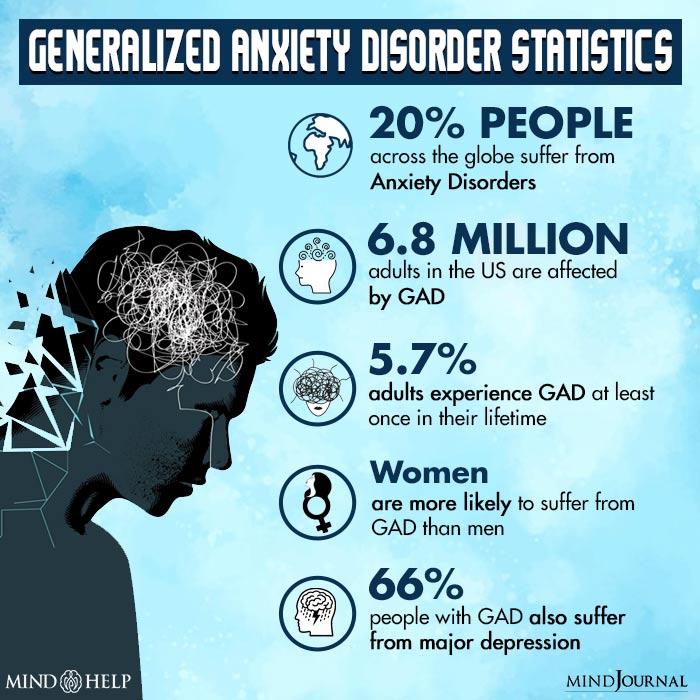
While anxiety can at times be normal in everyday situations that make us feel stressed like taking an exam or giving a presentation, when it becomes severe it can significantly impair our ability to function normally in our daily lives, including our school, job, household tasks and relationships.
However, anxiety can be helpful in some situations, such as when it helps us to be more alert and focused. But when it becomes excessive or persistent, it can interfere with our daily life and become an anxiety disorder.
But what what causes generalized anxiety disorder and other anxiety disorders? Before we can delve into what causes anxiousness, let us take a quick look at what anxiety disorders actually are.
Related: Causes Of Mental Health Issues: 6 Common Risk Factors, According To Science
What are anxiety disorders?
Anxiety disorders are a group of mental health conditions that are characterized by excessive and persistent feelings of anxiety or fear. These disorders can interfere with an individual’s ability to function effectively in their daily life, and can lead to a range of physical and emotional symptoms.
Studies reveal that anxiety disorders are the “most common group of mental disorders and generally start before or in early adulthood… Anxiety disorders involve dysfunction in brain circuits that respond to danger. ” Core features typically include –
- Excessive fear and worry
- Avoidance of perceived threats
- Social and performance fears
- Unexpected and/or triggered panic attacks
- Anticipatory anxiety
There are several different types of anxiety disorders, including:
1. Generalized anxiety disorder (GAD)
It is characterized by excessive and persistent worry and fear about a range of everyday events and activities. Understanding the symptoms of GAD and what causes generalized anxiety disorder can help us overcome it.
2. Panic disorder
It is characterized by recurring panic attacks, which involve sudden and intense feelings of fear, along with physical symptoms such as sweating, trembling, and heart palpitations.
3. Social anxiety disorder
It is characterized by intense fear and self-consciousness in social situations, along with physical symptoms such as blushing, sweating, and trembling.
4. Specific phobias
It is characterized by intense fear and avoidance of specific objects or situations, such as heights, spiders, or flying.
5. Obsessive-compulsive disorder (OCD)
It is characterized by intrusive and persistent thoughts or obsessions, along with compulsive behaviors or rituals that are performed in an attempt to reduce anxiety.
6. Post-traumatic stress disorder (PTSD)
It is characterized by anxiety and fear that result from experiencing or witnessing a traumatic event.
Anxiety disorders can be treated effectively with a range of therapies, including medication, cognitive-behavioral therapy, and mindfulness-based therapies. However, understanding what causes anxiousness and anxiety disorders can help us seek effective treatment and overcome the symptoms for good.
Related: What To Do When You Feel Anxious?
But what causes anxiety and depression? Now that we have a clear understanding of what anxiety disorders are, let us jump right in to find out what causes anxiety disorder.
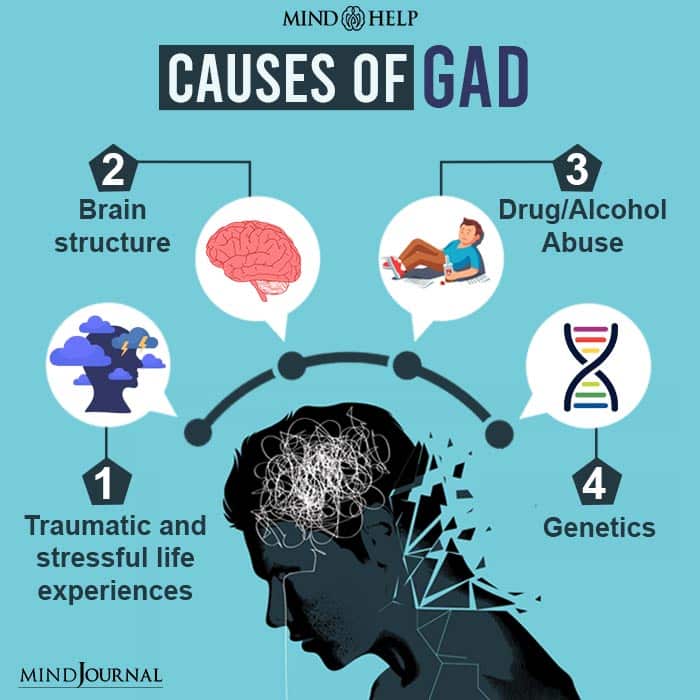
What causes anxiousness
So what causes generalized anxiety disorder and other anxiety-related conditions? Well, the exact causes of anxiety disorders are not completely understood currently as everyone experiences anxiety in a different way.
However, there are several factors that may contribute towards the development of anxiety and anxiety disorders in someone. It should be noted here that anxiety is not necessarily a character flaw or a sign of weakness in someone.
Here are some of the most common anxiety attack causes that tend to increase the risk of anxiety disorders in an individual –
1. Genetics
Genetics play a significant role in the development of anxiety disorders. Studies have shown that individuals with a family history of anxiety disorders are more likely to develop the condition themselves. It is believed that genetic factors can influence the functioning of certain brain chemicals and their receptors, which are involved in regulating mood and anxiety levels. This is what causes anxiety disorder.
Research has identified specific genes that may be associated with anxiety disorders, including genes that affect the production and regulation of neurotransmitters such as serotonin, dopamine, and gamma-aminobutyric acid (GABA).
These neurotransmitters are important for regulating mood and anxiety levels, and alterations in their production or activity can contribute to depressive anxiety. Genetics and heritability are undoubtedly one of the primary anxiety attack causes that we must consider.
However, it is important to note that genetics alone do not determine whether someone will develop an anxiety disorder. It is likely that the development of anxiety disorders involves complex interactions between genetic and environmental factors. Genetics is what can cause panic attacks.
Related: What Is Anticipatory Anxiety And How To Stop Worrying About The Future
2. Environmental factors
Environmental factors such as traumatic or stressful life events, abuse, neglect, or loss of a loved one, can also trigger the development of anxiety. Here are some of the most significant environmental factors that can lead to anxiety disorders –
A. Chronic stress
Most of us experience stress on a daily basis, but unresolved, chronic and excessive stress can increase the risk of anxiety. Studies have found that “stress and anxiety have intertwined behavioral and neural underpinnings.”
Exposure to chronic stress, such as ongoing work or school-related stress, financial strain, or relationship difficulties, can cause anxiety through a variety of physiological and psychological mechanisms.
When we experience stress, our bodies release hormones such as cortisol and adrenaline, which activate the “fight or flight” response and prepare us to respond to a perceived threat. However, if stress is ongoing and chronic, these hormones can continue to be released, which can lead to imbalances in the body and brain that can cause anxiety.
As repeated stress affects and imbalances the levels of neurotransmitters in the brain, chemicals that are responsible for transmitting signals between neurons in the brain, it can contribute to anxiety. Chronic stress can disrupt the balance of neurotransmitters such as serotonin, dopamine, and norepinephrine, which are involved in regulating mood, emotions, and anxiety levels.
Chronic stress can also lead to changes in the structure and function of the brain. Studies have shown that chronic stress can cause the hippocampus, a brain region involved in regulating emotions and memory, to shrink in size. This can lead to difficulties in regulating emotions and processing information, which can contribute to anxiety.
In addition, chronic stress can lead to physical symptoms such as headaches, muscle tension, and digestive issues, which can further exacerbate feelings of anxiety. It can also affect our behavior and coping mechanisms, making it more difficult to manage anxiety and other stress-related issues.
Still wondering what can cause panic attacks? Read on…
B. Early life experiences
Adverse childhood experiences (ACEs), such as neglect, abuse, and trauma, can impact brain development and shape a person’s vulnerability to depressive anxiety in later life. Studies have shown that ACEs are linked with “perceived stress, increased risk for anxiety disorders and altered cortisol.”
For example, individuals who experienced insecure attachment with their caregivers during childhood may be more likely to develop anxiety disorders later in life. This is definitely one of the crucial factors to consider when understanding what causes anxiousness.
Adverse experiences in childhood can also disrupt healthy brain development. The brain undergoes significant development during childhood and adolescence, and experiences of chronic stress or trauma can interfere with this development.
In particular, the amygdala, which is involved in processing emotions, and the prefrontal cortex, which is involved in regulating emotions, may be affected. This can lead to a heightened sense of anxiety and difficulty regulating emotions later in life.
Adverse experiences in childhood can also affect attachment styles and interpersonal relationships. Children who experience neglect or abuse may develop insecure attachment styles, where they do not feel safe or supported by their caregivers. This can lead to difficulty forming healthy relationships and may contribute to feelings of anxiety and insecurity.
Additionally, childhood experiences can shape an individual’s beliefs and perceptions of the world. Children who experience trauma or abuse may develop a negative view of the world and feel that they are in constant danger, leading to a heightened sense of anxiety. “Childhood trauma is considered to be a risk factor for developing anxiety,” explain researchers. This is what causes generalized anxiety disorder.
C. Exposure to environmental toxins
Exposure to toxins in the environment, such as air pollution, heavy metals and pesticides, can also increase the risk of developing depressive anxiety. Environmental toxins can disrupt the nervous and endocrine systems, causing chronic inflammation, triggering respiratory distress and damaging the nervous system.
It can also lead to imbalances in neurotransmitter function and brain function, contributing to anxiety.
Exposure to endocrine-disrupting toxins can result in hormonal imbalances, such as cortisol and estrogen, which can contribute to anxiety. Chronic inflammation caused by exposure to environmental toxins can lead to changes in brain function, further increasing the risk of anxiety.
Additionally, respiratory distress caused by exposure to air pollution can cause physical sensations common to anxiety, such as shortness of breath and a racing heart. This is what causes anxiety disorder.
According to research, genetics and environmental factors are the primary factors that contribute to the development of anxiety disorders. In fact, “The underlying structure of the genetic and environmental risk factors for the anxiety disorders is similar between men and women,” claim studies. This is one of the most easily ignored anxiety attack causes.
Want to learn more about what can cause panic attacks? Keep reading…
3. Brain chemistry
Brain chemistry can play a significant role in causing anxiety as well. Neurotransmitters are chemical messengers that help regulate mood, emotions, and other physiological processes in the brain. Imbalances or deficiencies in neurotransmitters, such as serotonin or gamma-aminobutyric acid (GABA), can contribute to anxiety symptoms.
For example, low levels of serotonin, a neurotransmitter that helps regulate mood, can lead to feelings of anxiety and depression. GABA is a neurotransmitter that helps to inhibit or slow down nerve impulses in the brain, and low levels of GABA have been linked to anxiety disorders.
Additionally, imbalances in other neurotransmitters such as norepinephrine and dopamine can also contribute to depressive anxiety. Changes in brain chemistry is what causes anxiety and depression.
Related: 10 Anxiety Facts You Must Know To Manage It Better
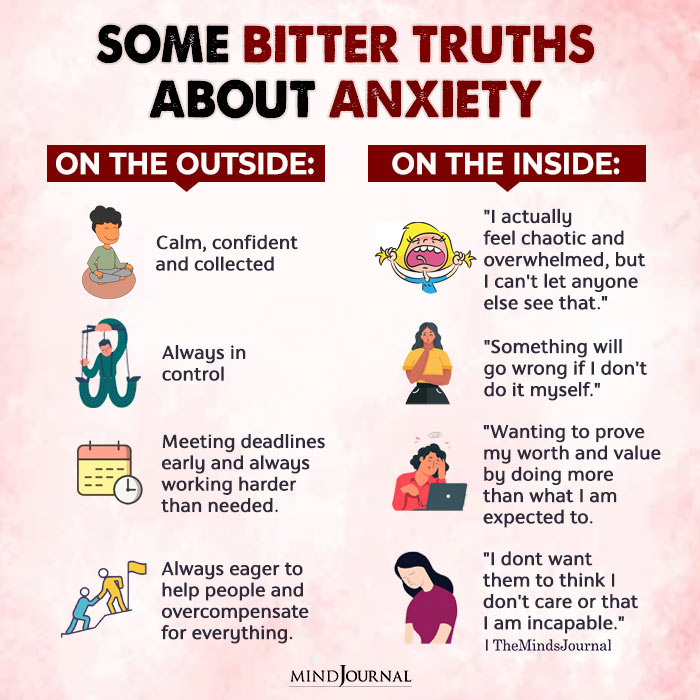
4. Medical factors and medications
Medical factors can contribute to the development of anxiety in several ways. Here are some examples:
A. Hormonal imbalances
B. Chronic pain
Hormonal imbalances, such as those that occur with thyroid dysfunction, menopause, or diabetes, can cause anxiety symptoms due to changes in hormone levels affecting brain chemistry.
Chronic pain conditions such as arthritis, fibromyalgia, or chronic migraines can lead to anxiety due to the persistent physical discomfort and associated stress.
C. Chronic illness
Living with a chronic illness such as cancer, heart disease, or multiple sclerosis can lead to anxiety due to the uncertainty of the illness and the impact it has on daily life.
D. Medications
Medications can cause anxiety as a side effect in several ways. Stimulants like caffeine, ADHD medication, or amphetamines can cause anxiety by increasing heart rate, blood pressure, and causing restlessness. Certain medications, such as corticosteroids, can alter the balance of neurotransmitters in the brain leading to mood changes and anxiety symptoms.
Withdrawal from certain medications like benzodiazepines or opioids can cause anxiety symptoms due to changes in brain chemistry and neurotransmitter levels. This is what what causes anxiety disorder.
Even certain antidepressants can initially cause or worsen anxiety symptoms in some individuals, though the effect is usually temporary and resolves over time with continued use of the medication. Hence, side effects from medications are what causes anxiousness.
E. Substance withdrawal
Withdrawal from certain substances, such as alcohol or opioids, can cause anxiety symptoms due to changes in brain chemistry and neurotransmitter levels.
The body becomes accustomed to the presence of the substance and when it is suddenly removed, the individual can experience physical and psychological symptoms, including anxiety. Substance use is something we need to consider when trying to figure out what causes anxiety and depression.
Is there anything else we need to know when figuring out what can cause panic attacks? Yes, let’s continue….
5. Major life events
Life events such as trauma, loss of a loved one, loss of employment, divorce or a breakup or major changes like moving to a new city can cause anxiety by triggering the body’s stress response.
The stress response is a natural physiological reaction to a perceived threat or danger, and it involves the release of stress hormones like cortisol and adrenaline.
Prolonged or repeated exposure to stressors can lead to chronic anxiety, as the body remains in a heightened state of alertness. Additionally, major life changes such as starting a new job, moving, or getting married can be stressful and trigger anxiety.
6. Substance use
Substance use can also cause anxiety and anxiety disorders. “Anxiety disorders, symptoms of anxiety, and substance use disorders (SUDs) commonly co-occur,” explains a 2010 study.
Some drugs, such as cocaine and amphetamines, can stimulate the central nervous system and cause physical symptoms such as increased heart rate and sweating, which can trigger anxiety.
In addition, substance use can alter brain chemistry and lead to imbalances in neurotransmitters, which can contribute to anxiety symptoms. Chronic use of drugs or alcohol can also lead to changes in the brain that increase the risk of anxiety disorders.
7. Personality type
Individuals with certain personality traits tend to be more vulnerable to developing anxiety and anxiety disorders. Our personality type can influence our emotional and behavioral responses to stress and perceived threats. Traits such as high neuroticism, perfectionism, avoidance, and high sensitivity can all contribute to anxiety.
Individuals high in neuroticism may be more prone to experiencing negative emotions such as fear and worry, leading to a heightened risk of anxiety. Perfectionism can lead to excessive worry about mistakes and failures, while avoidance can lead to social anxiety.
High sensitivity can lead to increased reactivity to stimuli in the environment, leading to heightened stress and anxiety. Studies have linked neuroticism and introversion as a marker of risk, for first-onset anxiety and depressive disorders. So our personality type can also be listed as anxiety attack causes.
Related: Quietly Struggling: 15 Signs You’re an Introvert with High-Functioning Anxiety
8. Sleep disorders
Wondering what can cause panic attacks due to anxiety? Sleep disorders can cause anxiety in a number of ways. First, lack of sleep or poor quality sleep can lead to fatigue and irritability, which can increase feelings of stress and anxiety.
Additionally, certain sleep disorders, such as sleep apnea or restless leg syndrome, can cause disruptions in sleep, leading to daytime sleepiness and difficulty functioning, which can also increase anxiety.
The fear of not being able to sleep or the anticipation of a poor night’s sleep can also lead to anxiety and stress. Studies have found that “sleep problems are prevalent across anxiety disorders and that insomnia and anxiety may show a bidirectional relationship.”
Overall, sleep disorders can create a vicious cycle of poor sleep and increased anxiety, making it important to seek treatment for both issues.
9. Nutrition
Consuming a diet high in processed foods, sugar, caffeine, and alcohol can lead to increased feelings of anxiety and stress. These types of foods can cause spikes and crashes in blood sugar levels, leading to mood swings and irritability.
“Analysis revealed an association between higher levels of anxiety and high-fat diet, inadequate tryptophan and dietary protein, high intake of sugar and refined carbohydrates, and ‘unhealthy’ dietary patterns,” explain researchers.
In fact, further research suggests that a diet lacking in certain nutrients, such as omega-3 fatty acids, magnesium, and B vitamins, can contribute to the development of anxiety disorders. Poor nutrition can also impact gut health, which has been linked to anxiety and other mental health conditions. Maintaining a balanced and healthy diet can help reduce the risk of developing anxiety and improve overall mental well-being.
These are the factors that we need to consider when trying to figure out what causes anxiousness. Now let’s take a deeper look at how anxiety manifests.
What does anxiety feel like?
When you have anxiety you can’t help but believe that only the worst will happen to you for no specific reason as you have developed an all-or-nothing thinking. Anxiety can feel psychologically and emotionally overwhelming & distressing. It can make you feel like you’re constantly on edge, anticipating the worst-case scenario, or like you’re unable to control your thoughts or feelings.
As it is a complex emotional state that has a strong impact on our mind, anxiety can seriously affect our cognitive, behavioral, and emotional functioning –
1. How anxiety affects cognition
Anxiety can lead to racing thoughts, difficulty concentrating, and a tendency to ruminate or obsess over things that cause stress. Anxiety can also lead to negative self-talk and the belief that one is not capable or competent, which can further exacerbate anxiety symptoms.
Studies show that anxiety helps to promote our ability to detect threatening stimuli, and affects our thinking, learning, perception, attention, memory, executive function and harm avoidance. “At the most basic level this tends to be associated with improved perception of environmental changes irrespective of valence,” explains the study.
Related: 3 Unrealistic Beliefs That Create Anxiety And Depression And How To Be Rid Of Them
2. How anxiety affects behavior
Anxiety can cause individuals to engage in avoidance behaviors, such as avoiding social situations, and procrastinating work tasks, or other responsibilities that may cause stress. This can lead to a cycle of avoidance that reinforces the anxiety, making it more difficult to overcome.
“High-anxious individuals are more likely to avoid such social interactions as communicating with strangers,” explains a study. It can also make someone become irritable, easily overwhelmed, and excessively worried.
3. How anxiety affects emotions
Anxiety can cause individuals to experience intense emotions, such as fear, panic, apprehension and worry. These emotions can be overwhelming and may interfere with an individual’s ability to function effectively in their daily life.
Anxiety can also cause individuals to feel irritable, agitated, and easily overwhelmed. This can lead to feelings of frustration, restlessness, anger, sadness and a sense of impending doom. In some cases, anxiety can lead to the development of other emotional disorders, such as depression.
4. How anxiety affects physical health
Anxiety can also lead to a range of physical symptoms, including rapid heartbeat, sweating, and shortness of breath. These physical sensations can intensify feelings of anxiety and make individuals feel as though they are in danger. These symptoms can be distressing and can exacerbate the sense of anxiety.
Do you have anxiety?
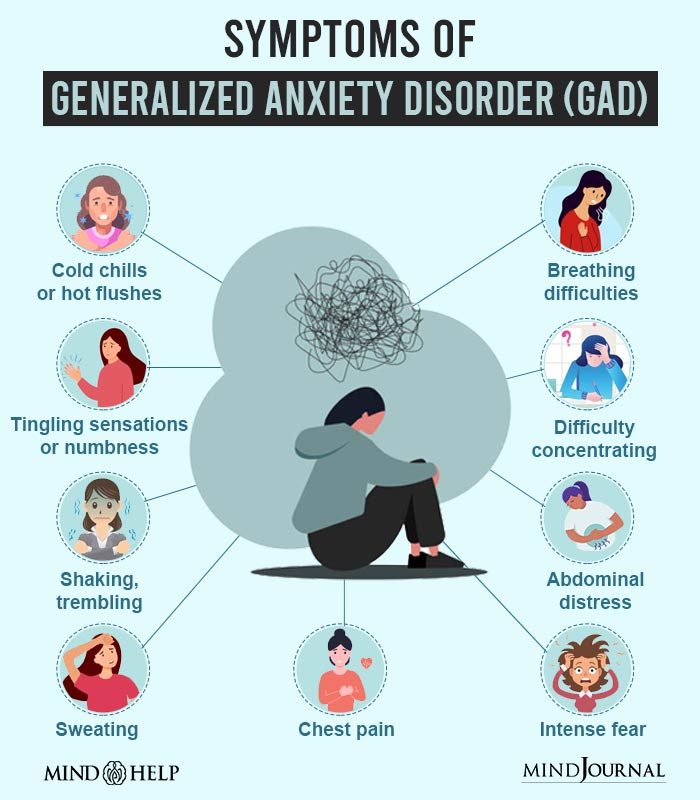
So can you know that you have severe anxiety? Well, anxiety can manifest in various physical, emotional, and behavioral ways. Here are some common signs of anxiousness:
1. Excessive worry
Worrying about things that may or may not happen, or worrying about things that are out of one’s control. This is the most common sign of anxiety disorder.
2. Restlessness
Feeling unable to sit still or feeling a need to constantly move. You feel like you need to be constantly doing something.
3. Fatigue
Feeling tired, even when getting enough sleep, due to the stress and tension associated with anxiety. This is another sign of anxiety disorder.
4. Difficulty concentrating
Finding it hard to focus or concentrate due to racing thoughts or worries.
5. Muscle tension
Related: How to Reclaim Your Power Absorbed by Anxiety: 5 Ways
Experiencing muscle tension, aches, or pains, especially in the neck, shoulders, and back.
6. Irritability
Another common sign of anxiety disorder is irritability. Feeling easily frustrated, agitated, or short-tempered.
7. Panic attacks
Sudden and intense feelings of fear or panic, accompanied by physical symptoms such as rapid heartbeat, sweating, and shortness of breath.
8. Avoidance behaviors
Avoiding situations or activities that you perceive as stressful or triggering.
9. Overthinking
Dwelling on negative thoughts and scenarios, and finding it difficult to switch off one’s mind. There is no doubt this is a widely observed sign of anxiety disorder.
10. Feelings of dread
Having a sense of impending doom or dread, making you feel like something bad is about to happen even if there’s no real threat.
11. Sleep disturbances
Difficulty falling asleep or staying asleep due to anxiety and worry.
12. Racing thoughts
Making your thoughts feel like they’re racing, making it difficult to concentrate or focus on anything else.
Overcome anxiety
Understanding what causes anxiousness and anxiety disorders can help us better identify our triggers and enable our mental healthcare provider to create an effective treatment plan.
Anxiety can have many different causes, including environmental factors, medical conditions, genetics, brain chemistry, and life events. While some of these causes may be outside our control, there are many strategies and treatments available to manage and alleviate anxiety symptoms. These may include therapy, medication, lifestyle changes, and other self-care techniques.
If you are experiencing any of the signs of anxiety, it may be helpful to seek support from a mental health professional who can provide guidance and treatment to manage your anxiety symptoms.
Related: 25 Quick Ways To Boost Your Mood When You’re Having A Bad Day
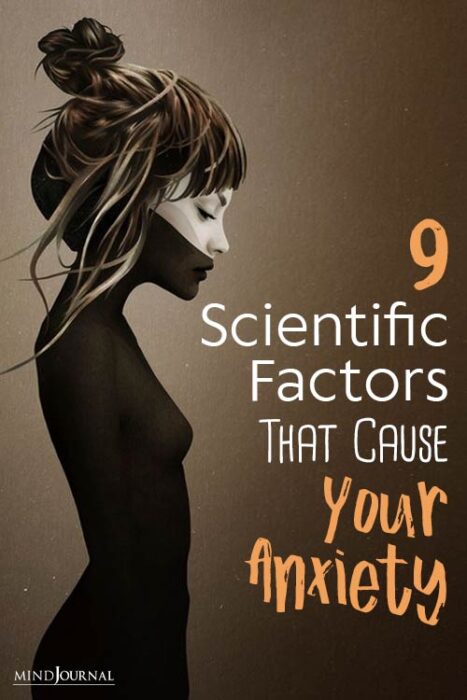
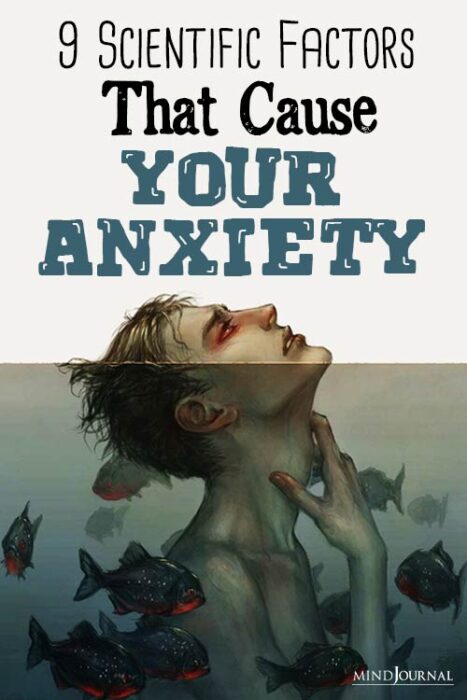
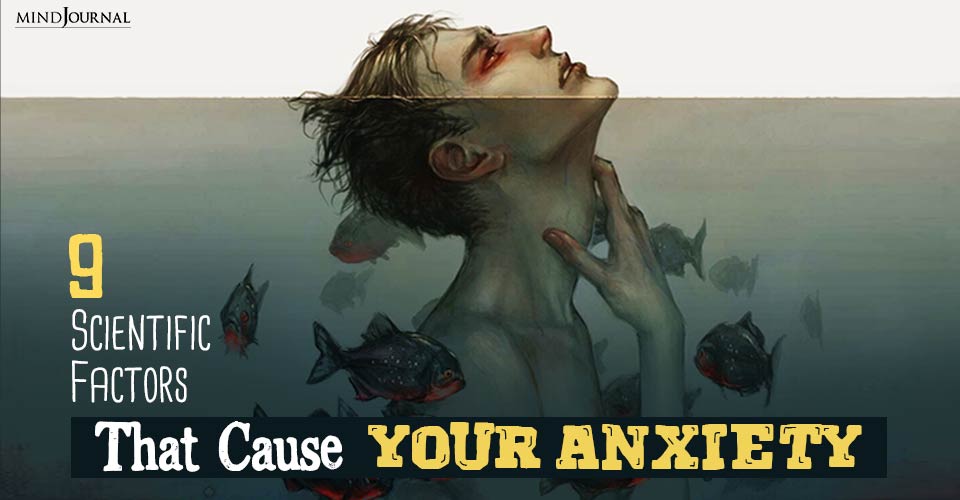







Leave a Reply
You must be logged in to post a comment.